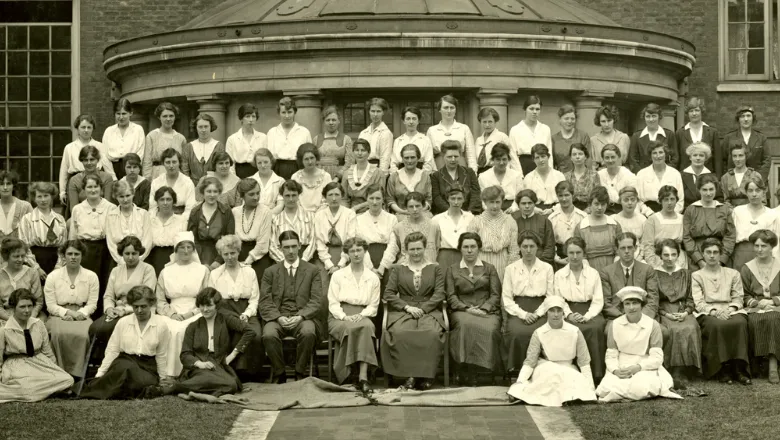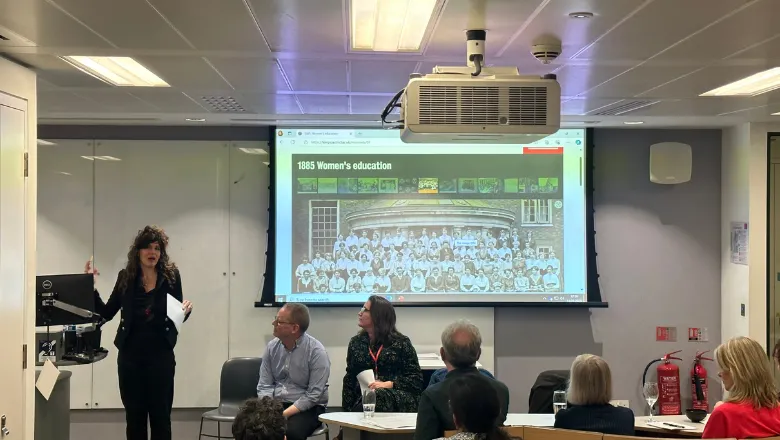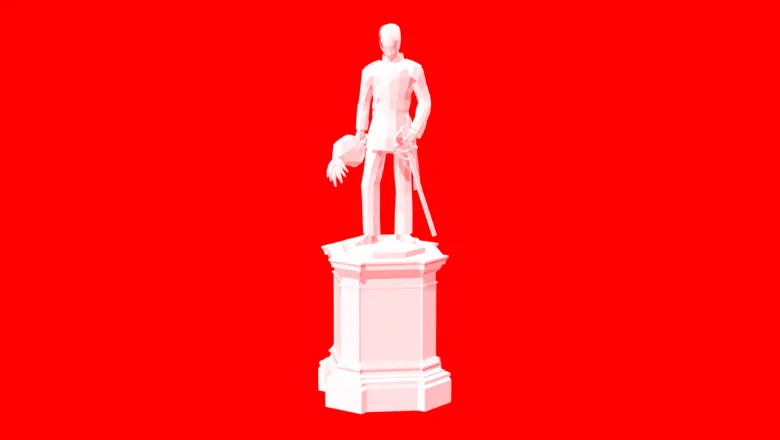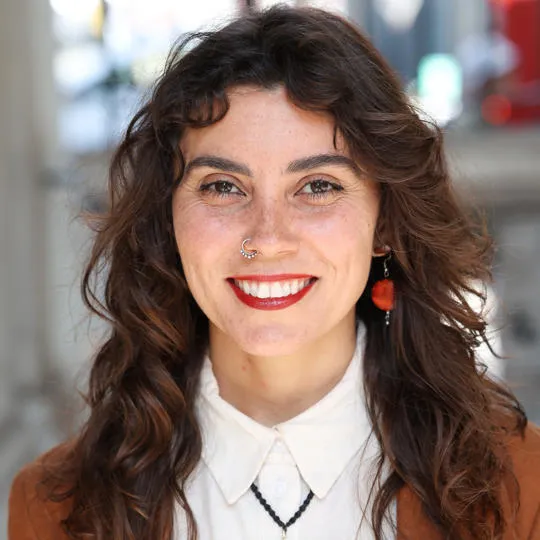King’s has operated at the heart of networks of political, social and economic power since its founding. These connections to systems of power lead us to reflect on how our institution has evolved and its role in British history. Through King’s Past, we shed light on the complexity of the University's history, interrogating how each element shapes the modern university we are today.
Professor Jon Wilson, Head of the Department of History
18 February 2025
New interactive platform explores King's history and future
King’s Past has launched a new platform to chart the development of King’s College London from its creation in 1829 to the present day.

The King’s Past platform charts the University's history through 13 pivotal moments, such as its founding as an Anglican university in 1829, the opening of the King’s Ladies Department in 1885, and its connections to local, national and global systems of power, including the British empire and trans-national training networks. The platform also hosts a comprehensive database that lists significant people, organisations, places, events and donations in King's history.
At the launch event on 14 January, Professor Jon Wilson, Head of the Department of History, and Dr Érika Melek Delgado, Lecturer in the History of Empire and co-ordinator of the project, explained why understanding King’s past is vital for imagining King’s future.
By charting its nearly 200 year history, this project reveals the contradictions in the University's identity – from links to slavery to leading anti-apartheid movements, and from Anglican beginnings to religious diversity. One of the most interesting tools in our platform is an inter-relational database to explore the network of power that has trespassed King's in its local and global level, from economic power through to political and intellectual power, looking at funders, students and staff bodies throughout its history.
Dr Érika Melek Delgado, Lecturer in the History of Empire in the Department of History
The project brings together academics from across disciplines to interrogate pivotal moments in King's existence. At the launch event, Dr Hannah Dawson, Reader in the History of Political Thought in the Department of History, investigated the experiences of the first women to study at King's in the 1880s.
Professor Jim Bjork, Professor of Modern European History in the Department of History, examined connections between King's and the 'small nations' in the early twentieth century, when borders were re-established after the First World War.
Moving into the 1960s, Dr Jean Smith, Lecturer in Liberal Arts, Sustainability and Socially-Engaged Education in the Department of Interdisciplinary Humanities explored the impact of the end of the British Empire on King's student body, academics and alumni and what decolonisation means in today's society.

The teaching part of the project is represented by the Investigating King's Colonial Past module, which takes a public history approach and offers all students at King's the chance to discuss these issues at a deeper level.
Bringing statues to life
More than twenty students, from all parts of King’s, contributed to the project as research assistants on undergraduate internship grants or volunteers.
Research interns used demonumentaAR, new technology developed by the University of São Paulo and funded by CAPES, to analyse statues on King’s campuses and nearby. The technology allows for 3D scanning of statues to develop virtual exhibitions, which are accompanied by voiceovers recorded by the students to explain a monument’s history.
Dr Melek Delgado and Luís Felipe Abbud, a PhD exchange student from the University of São Paulo, supported students with using demonumentaAR to create these virtual and augmented reality models. Students identified figures that they wanted to investigate, developing historical research, articles and scripts for their chosen statue to give a broader perspective of the person depicted.
Through focusing on the original donors to the university, Liberal Arts graduate Sadie Mansfield analysed the history of Thomas Guy. He founded Guy’s Hospital through money left in his will, which then became part of King’s in 1998. Sadie explored Guy’s financial entanglements with slavery and the slave trade, reflecting on how this involvement contradicts his humanitarian impulse towards the sick in London.
Throughout my time at King’s, I investigated histories of colonialism and imperialism from a range of disciplinary perspectives. As a site of teaching, learning, and research, King’s has played an active role in shaping knowledge, practices of knowledge, and the hierarchies embedded within these. It is only by reflecting on the past that we can understand present day inequalities.
Sadie Mansfield, Liberal Arts graduate
Gian Ghatora, an English undergraduate student, explored the William Gladstone statue on the Strand. He explored how the statue shows only a glimpse of Gladstone’s past, using demonumentaAR to offer a fuller picture of the former Prime Minister’s life and to explain how his family gained their wealth.
Abiufo Dan-Abia, student of Politics, Philosophy & Law LLB, chose to create a 3D scan of a statue that does not – but arguably should – exist. Through the example of former student James Africanus Horton, Abiufo demonstrated the problems with how historical narratives have developed and the groups they have conventionally favoured.

Trawling the archives
The Archives & Research Collections team has supported the King’s Past project since its beginnings as an undergraduate module in 2020 by researching in the catalogues and lists, producing the raw evidence and running group sessions for students. For both the module and the new online platform, the team has been impressed by the way students have engaged with the huge and varied history of King’s with fresh perspectives.
King’s College London Archives is one of the biggest and most complete university archive collections in the UK. Many of the stories highlighted on the King’s Past platform start in the evidence preserved here, in thousands upon thousands of files, ledgers, letters, drawings and photographs. We’re delighted to have supported the research of the many staff and students who’ve worked on King’s Past so far – but we know that there’s so much more waiting to be discovered.
Kate O’Brien, Archives Collections Manager
Digitising the past – for the future
Once information and images had been sourced from the archive, King’s Digital Lab built the King’s Past platform to reflect 13 key moments in the College’s history. The objective was to create a resource that could be fully accessible by anyone with an interest in King’s and its development, including staff, students and the public.
The King's Past project combines technical innovation with scholarly research to highlight histories of the University. The website is built using modern web technologies and standards with a focus on sustainability and scalability. Along with scholarly articles, it exposes the network of relationships between people, organisations, places and moments to create a resource that reveals the interconnected histories of King's.
King’s Digital Lab
The ability to create resources that people can interact with – the website and the DeMonumenta app – is really crucial for allowing the King’s community and beyond to think through their own questions about the university’s history.
Sadie Mansfield, Liberal Arts graduate
The project team aim to continue growing the platform with more information about the College’s history and future to mark the 200th anniversary of King’s in 2029.
As the bicentenary approaches in 2029, King's Past can assume a vital role in ensuring the institution is equipped to promote educational access for our students of today and beyond.
Dr Érika Melek Delgado, Lecturer in the History of Empire in the Department of History




